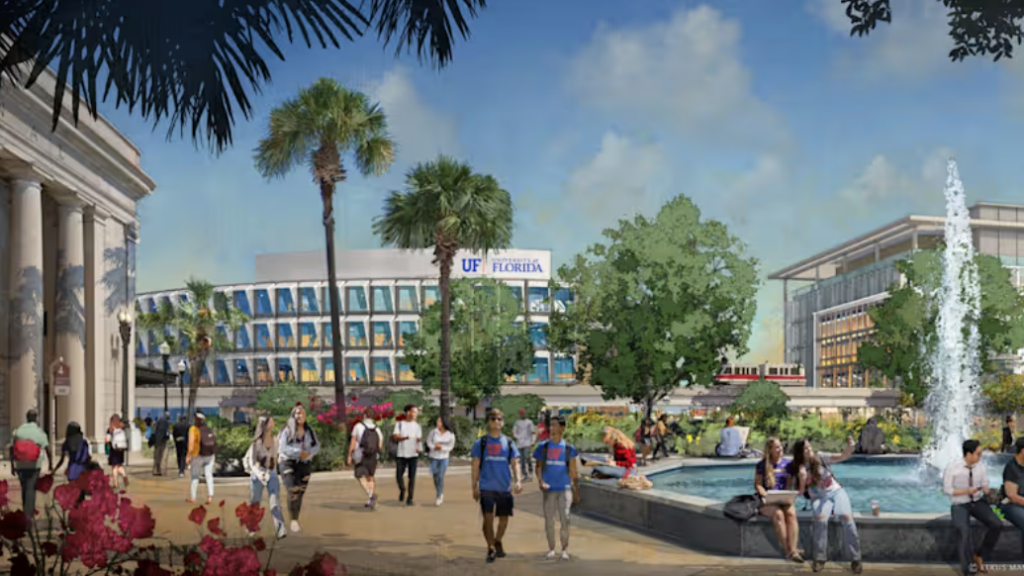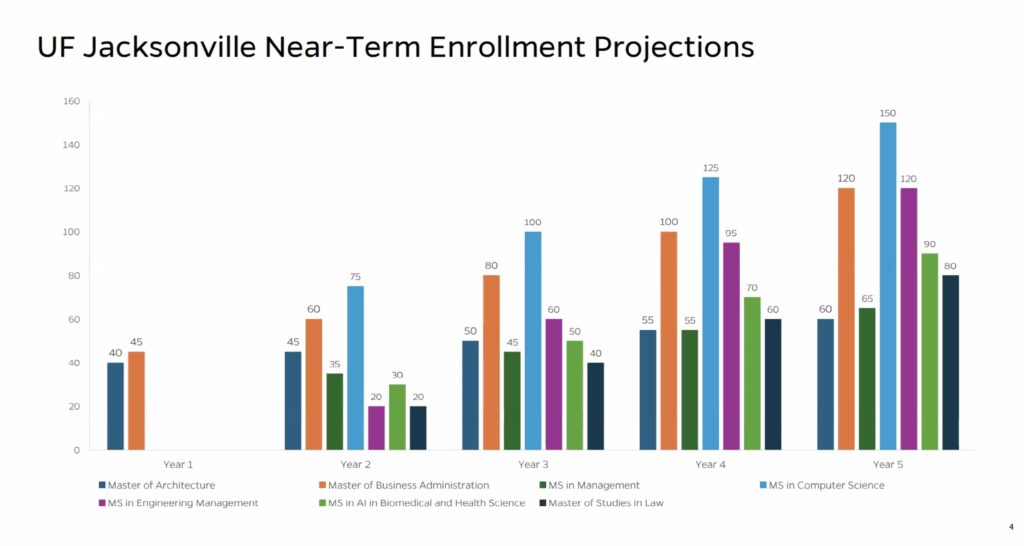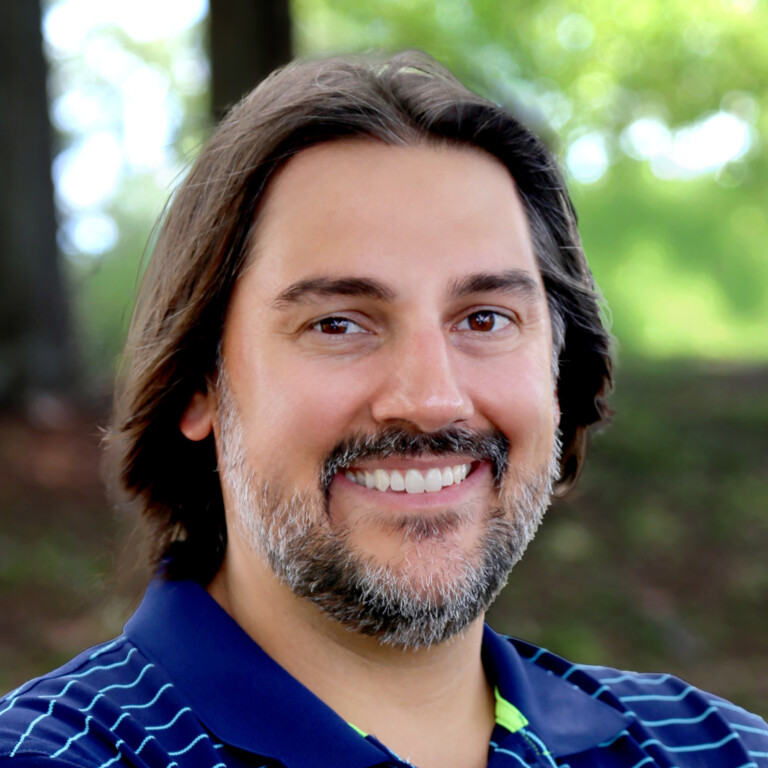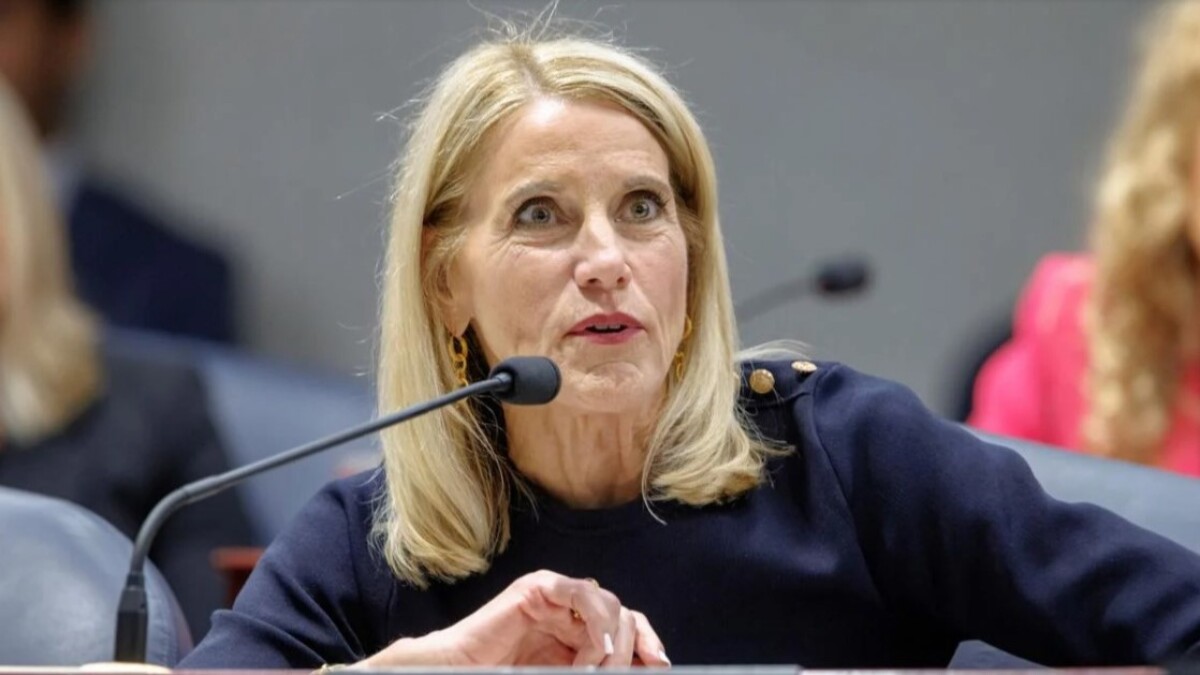The University of Florida wants a deal with City Council for its proposed graduate campus in LaVilla signed by the end of June — an agreement that will include land rights to start construction and bring the school’s semiconductor institute to Jacksonville.
Officials with UF and the city’s Downtown Investment Authority released new conceptual renderings, enrollment projections and a longer list of graduate programs Wednesday of what could be a 20-year plan to build out the 23.2-acre LaVilla graduate campus.
Council approved its first $50 million for the project in March 2023 in the final months of then-Mayor Lenny Curry’s second term. It was matched by $50 million in private fundraising and $50 million by the state, which has since risen to $150 million.
The city has pledged the additional $50 million to the project, but it as not been budgeted. The new $50 million request is to help ensure the semiconductor institute locates in Jacksonville.
DIA CEO Lori Boyer told City Council members who attended the “Brunch and Learn” workshop Wednesday that UF and Mayor Donna Deegan’s administration are still negotiating pieces of the redevelopment agreement, but she intends to file legislation with council on May 21 to approve the real estate deal and $50 million boost from the city by June 24.
The council’s consideration of the broader UF proposal will overlap with the decision on whether to purchase the former Interline Brands site on West Bay Street from Gateway Jax Inc. so the university can begin graduate classes in the fall or make a trade for 1 acre of public land at Riverfront Plaza.
UF Board of Trustee Chair Mori Hosseini, who helped lead the workshop at City Hall, says the request for the city to double its cash investment in the campus comes after the state Legislature approved $80 million for the Florida Semiconductor Institute last year as part of the fiscal year 2024-25 budget.
He says UF has looked to the revitalization Phoenix saw in its downtown after Arizona State expanded and Tampa’s Water Street after a separate UF expansion as models of what could happen in LaVilla.
“It’s going to help us as the university to be in a big city. It’s going to help the city of Jacksonville. … For any city to be successful, you will see, you have to have a thriving downtown. I don’t know how else to say that. And I believe, with what the University of Florida is going to do, is going to totally change the face of Downtown Jacksonville,” Hosseini said.

The semiconductor institute would be housed in a $45 million advanced technology building, one of two buildings that would be constructed during phase one of the graduate campus, the plans released Wednesday show.
UF officials say the current appetite by political leaders in Washington to manufacture semiconductors in the U.S. shows the immediate need to train students for that industry.
David Norton, vice president for research at the UF Office of Research, says that national security is the sector that will give the institute longevity, and that Jacksonville’s existing military presence makes it a good home for the program.
“It is in that area that this activity with Jacksonville is uniquely positioned in the long run, leveraging the semiconductor investment to where we can create something unique to Jacksonville — leveraging the defense assets that are here in this region, leveraging the fact that you have an airport with airline service directly to Washington, D.C. There’s just a lot of reasons why national security as a long-term focus for this actively makes a tremendous amount of sense,” Norton said.
20-year timeline
The final documents are not complete, but DIA says the development agreement expected to go before council in May would give UF deed to the Interline Building, a 2.36-acre surface parking lot just to the east on Bay Street and a 1.22-acre vacant lot currently used as auxiliary parking for the Jacksonville Regional Transportation Center.
It also includes an option for UF to acquire the historic train station in LaVilla and the connected Prime Osborne Convention Center and parking lot within five years. The option to develop these sites would expire in 20 years.
Those four pieces of property have been appraised at $28.29 million, according to the DIA, adding nearly $30 million in donated land to the $50 millions expected in the legislation. UF is also considering a fifth property for the campus that will not be included in the agreement. That parcel, adjacent to the convention center parking lot, is currently owned by The Vestcor Companies Inc. and valued at $2.58 million.
Boyer said UF would not begin to develop these pieces until after the first phase was compete and established. The train station would include ground-floor retail with food and beverage establishments to support students but also be open to the public, she said.
“Once they start to have a robust campus, with a number of students here, we’re getting into that 1,500 student range, you certainly need the food and beverage establishments in the vicinity, you need that activation in LaVilla, and that’s what they envision having in the train station building,” Boyer said.

Some council members have become increasingly queasy when it comes to awarding cash incentives to developers, particularly for Downtown projects, as the City Council auditor has projected a nearly $80 million revenue shortfall in the coming years.
Nick Howland, an at-large Republican and council vice president-elect, told UF officials Wednesday that he sees the project as a priority and predicts council will find the $50 million. But he urged Boyer and her staff to examine and prioritize some of the DIA’s current incentivized projects and find money that can be shifted to the UF campus instead of pulling from any new city revenue.
UF projects the LaVilla campus will have 685 students with a goal of 1,500 across seven degree programs by 2030; around 250 permeate operating jobs; and 4,000 construction jobs over the campus’s first two build phases.
Council member Ron Salem compares the prospects of the UF campus in LaVilla to the growth that UF Health Jacksonville north of Downtown has experienced since the 1980s.
”We may not be around 50 years from now, but I think you’ll see a similarly transformation Downtown with this,” Salem said.
More programs, more students
UF says the Jacksonville campus will be home to more programs than the original vision outlined in 2023, which focused on financial technology. The list released Wednesday shows these masters programs:
- A professional one- and two-year master’s in Business Administration program
- Science in Management.
- AI in Biomedical and health Sciences.
- Engineering Management.
- Computer Science.
- Studies in Law.
- Architecture.
- Future programs based on market demand.
The latest development timeline shows that a Master’s of Architecture program will be the first to launch at the 801 Bay St. building in August of this year.
Kurt Dudas, UF vice president of strategic initiatives in the Office of the President, told council that the faculty will be a mix of tenure-track professors and adjunct and instructional faculty. UF expects some of the research faculty will live in Jacksonville while others could commute from Gainesville.
Hosseini says the campus would eventually host doctoral programs.
To buy or to swap?
Before city lawmakers vote on the agreement with UF, two opposing pieces of legislation will determine how the city will acquire the first piece of the campus.
Salem has been staunchly opposed to a landswap deal with Gateway Jax for the city to take ownership of the Interline building. He introduced his own bill to direct Deegan’s office to negotiate and make Gateway a cash offer capped at $8 million.
But the DIA’s bill to swap the land for a piece of Riverfront Plaza, the former Jacksonville Landing, was also introduced at last week’s council meeting. Gateway plans to build a 17-story hotel, condominium and retail building on the site that would connect to the public park currently under construction.
Gateway CEO Bryan Moll told Jacksonville Today that his company has an access agreement with UF to enter the Interline Building. He said university personnel have been in the building “multiple times.”
“We have been working with UF from the get-go assuming this is going to get into their hands one way or another,” Moll said. “And if the deal is not done by the time they want to have students in classrooms, we’ll let them use it. I mean, there’s no reason why we wouldn’t.”
“We care so much about UF coming to Jacksonville and having students in 801 Bay Street, if the deal is not even done, they can have students in the classrooms.”
This story was updated to reflect that the city already pledged an additional $50 million to the project. That amount has not yet been budgeted.







